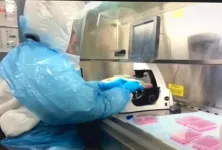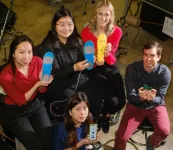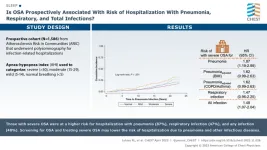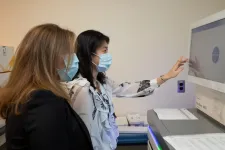(Press-News.org) Public and private organizations around the world are developing fusion energy devices that could serve as models for fusion power plants. Scientists are striving to duplicate the fusion power that drives the sun and stars as a source of carbon-free energy to generate electricity without contributing to climate change.
While fusion plants could help meet global energy demands without emitting greenhouse gases and producing long-lived radioactive waste, they could also have risks — many of which were discussed at a two-day workshop hosted by the U.S. Department of Energy’s (DOE) Princeton Plasma Physics Laboratory (PPPL) and sponsored by the DOE’s National Nuclear Security Administration (NNSA).
The workshop, “Fusion Energy and Nonproliferation,” included representatives from government, national laboratories, Princeton University, and other academic institutions, as well as representatives from private fusion developers like Commonwealth Fusion Systems and Helion. Princeton University’s Andlinger Center for Energy and the Environment held the January 25 and 26 event.
The workshop broadly focused on identifying questions both government and the fusion industry should start addressing about the low, but possible, risks of fusion being linked to nuclear proliferation — the spread of nuclear weapons, nuclear weapon technology, or materials necessary for the development of such weapons to countries that do not now have them.
“The workshop was successful in bringing together a broad array of participants to discuss topics that will be critical to the commercial development of fusion energy systems,” said Michael Ford, PPPL’s associate laboratory director for engineering and lead coordinator for the workshop. “This event kick-started the formation of a community of interest. There is more work to do, but this was a critical first step in moving the conversation forward.”
The event was held under rules that promote free and open discussion, which means that while attendees can be identified, comments and positions taken during the workshop cannot be attributed to any individual. Topics covered at the two-day workshop included, 1) the risk of clandestine or covert production of special nuclear material; 2) management of tritium, a form of hydrogen used in fusion facilities, and lithium-6, which is needed to produce the tritium fuel during the power plant operation to make fusion a self-sustaining energy source; 3) energy justice, social licensing, and DEIA (diversity, equity, inclusion, and accessibility) issues related to nonproliferation; 4) inertial confinement fusion, which uses lasers to compress fuel capsules to produce energy; and 5) regulatory frameworks for fusion. A summary report was produced after the workshop.
Most participants stressed that while any risk of future fusion energy systems contributing to nuclear proliferation is very low, the community should nevertheless start examining any concerns now and be clear about any findings. For example, stakeholders should consider whether current regulations are sufficient to cover fusion energy systems or if there should be new policy to cover those systems.
Several panelists noted the significance of this workshop occurring in the larger context of recent fusion advances around the world including the White House Summit in March 2022 — “Developing a Bold Decadal Vision for Commercial Fusion Energy” — as well as the recent news of fusion ignition at the DOE’s Lawrence Livermore National Laboratory and the development of an extremely powerful electromagnet by Commonwealth Fusion Systems in September 2021.
There have been record amounts of investment in the private fusion industry, and the DOE also unveiled a new milestone-based public-private program that would accelerate the development of commercial fusion power.
Speakers further noted that the White House is currently working with the intelligence community to protect U.S. fusion technology and making sure that the Department of Defense monitors fusion development, since it could lead to defense applications.
In addition to technical discussions, there was also a panel discussion about the relation of fusion energy and proliferation considerations to energy justice. The panelists agreed it is important to work with a broad range of communities to ensure that building fusion power plants will not create disproportionate hardships for any of them, and to build trust with those who have had negative experiences with the energy industry in the past.
If the fusion industry does not help ensure that both the benefits and potential burdens of fusion energy are well understood, commercialization could be seriously hampered. The goal for the workshop in this area was to examine whether there were unique energy justice considerations tied to proliferation risk.
Representatives of private fusion companies also offered their perspectives. They noted that new rules may not be needed to regulate future fusion facilities because any efforts to modify fusion devices to enrich nuclear material, for instance, would be extremely difficult and easily detectable by the international community.
In addition, industry representatives expressed concern that enacting unnecessarily restrictive fusion-related laws could end up stifling fusion commercialization, which would slow the deployment of fusion, potentially increasing climate impacts. In general, the speakers advocated for weighing the pros and cons of such laws and keeping in mind practical considerations.
Other speakers discussed legal and regulatory concerns, noting that current nonproliferation frameworks do not cover fusion facilities. However, there are formal controls in place covering tritium, an isotope of hydrogen that is critical to fusion operations and which also has implications for proliferation. The management of tritium inventories in fusion facilities generated significant discussion at the workshop, and there was consensus that additional discussion was needed regarding the necessity for any changes to the existing tritium control and export regimes.
Plenary speakers at the workshop included Rian Bahran, assistant director for nuclear technology and strategy in the White House Office of Science, Technology, and Policy; Scott Hsu, DOE lead fusion coordinator; David LaGraffe, associate assistant deputy administrator for defense nuclear nonproliferation research and development at the NNSA; Robert Goldston, former PPPL director; Stephanie Diem, assistant professor of engineering physics at the University of Wisconsin-Madison; Seth Hoedl, president and chief science officer of the Post Road Foundation; Robert Mumgaard, co-founder and chief executive officer of Commonwealth Fusion Systems; Sachin Desai, general counsel for Helion; and Amy Roma, partner in the Hogan Lovells law firm; among many others.
Workshop organizers have received positive feedback about the workshop. “We have received multiple requests for follow-on briefings to discuss the workshop's outcomes,” Ford said. “I anticipate follow-on workshops and conferences as fusion energy system development continues.”
PPPL, on Princeton University's Forrestal Campus in Plainsboro, N.J., is devoted to creating new knowledge about the physics of plasmas — ultra-hot, charged gases — and to developing practical solutions for the creation of fusion energy. The Laboratory is managed by the University for the U.S. Department of Energy’s Office of Science, which is the single largest supporter of basic research in the physical sciences in the United States and is working to address some of the most pressing challenges of our time. For more information, visit https://energy.gov/science
END
PPPL hosts workshop on fusion energy and nonproliferation
2023-04-13
ELSE PRESS RELEASES FROM THIS DATE:
Nurses trained via virtual reality performed better than those trained by inpatient clinical training
2023-04-13
In search of novel tactics to accommodate a larger student body and fulfill workforce demands, nursing schools are developing new approaches to optimize learning, engage learners, and provide methods to ensure competency in future nursing graduates.
A recent study by Bethany Cieslowski, associate professor of Nursing, and colleagues found that immersive virtual reality (VR) training has been shown to be as effective as inpatient training for students learning to provide care for acute care pediatric ...
Hallmarks to improving pancreatic cancer therapy identified by UC Irvine researchers
2023-04-13
Irvine, Calif., April 13, 2023 — Scientists from the University of California, Irvine, the University of Michigan and the University of Texas MD Anderson Cancer Center have made a significant contribution to the field of pancreatic cancer research. Their new study presents several crucial themes in the biology of pancreatic cancer that can serve as hallmarks for pancreatic cancer therapy. These themes include genomic alterations, metabolism, the tumor microenvironment, immunotherapy and innovative clinical trial design. The study appears in the journal Cell.
(Link to study: https://www.cell.com/cell/fulltext/S0092-8674(23)00142-3)
Pancreatic ...
Four major Illinois research institutions form a collaboration to improve urban forest drought resilience
2023-04-13
Scientists at four leading Illinois research institutions, three in the Chicago region, are forming a new collaboration to study the effects of drought on urban trees and develop more effective drought response strategies nationwide through a grant from the National Oceanic and Atmospheric Administration (NOAA).
The project is being led by researchers at The Morton Arboretum in conjunction with the U.S. Department of Energy’s Argonne National Laboratory, the University of Chicago and the Illinois State Water Survey at the Prairie Research ...
Good news! Only a modest reduction in added sugars consumption is needed to achieve the Healthy People 2030 target
2023-04-13
Ann Arbor, April 13, 2023 – Reducing caloric intake from added sugars is a Leading Health Indicator in Healthy People 2030, a national public health initiative led by the US Department of Health and Human Services that sets data-driven national objectives to improve health and wellbeing over the next decade. Although many Americans consume too much sugar, investigators found that only a modest reduction in added sugars intake is needed to reach a population mean of 11.5% of calories from added sugars by 2030. Prioritizing reducing added sugars intake among people not meeting recommendations could help those most at risk for chronic disease related to added sugars consumption. They report ...
T-cell vaccine for COVID-19 may last longer than current vaccines
2023-04-13
UNIVERSITY PARK, Pa. — The current COVID-19 vaccines are designed to trigger an antibody response to the SARS-CoV-2 spike protein, which is vulnerable to mutations that could make the vaccine less effective over time. Focusing on the T-cell instead, Penn State researchers partnered with Evaxion Biotech on a study that was the first to demonstrate the effectiveness of an artificial intelligence-generated vaccine in a live viral challenge model. Such a vaccine may provide long-lasting immunity against future emerging variants and could be used as a model for other seasonal viral diseases ...
Rice U. students engineer socks for on-the-go neuropathy treatment
2023-04-13
HOUSTON – (April 13, 2023) – Need a little spring — or buzz — in your step? A wearable electrical-stimulation and vibration-therapy system designed by Rice University engineering students might be just what the doctor ordered for people experiencing foot pain and balance loss due to diabetic neuropathy.
Rice engineering students in the StimuSock team — Abby Dowse, Yannie Guo, Andrei Mitrofan, Sarah Park and Kelly Xu — designed a sock with a smart insole that can deliver both transcutaneous electrical nerve stimulation (TENS) and vibration therapy that block pain signals to the brain and ...
UC Davis study finds tweets can amplify, disrupt, unite and divide
2023-04-13
Social media connects people and amplifies different aspects of humanity in good and bad ways. But the effects of social media appear neither universally good nor bad, but rather present an oscillating, dynamic system that can be divisive but also uniting, a new University of California, Davis, study suggests.
Department of Communication researchers said their findings both in an observational study and simulation speak to the ongoing debate about social media’s contributions to political polarization, misinformation and echo chambers. To conduct their research, ...
Highlights from the journal CHEST®, April 2023
2023-04-13
Glenview, Illinois – Published monthly, the journal CHEST® features peer-reviewed, cutting-edge original research in chest medicine: Pulmonary, critical care and sleep medicine and related disciplines. Journal topics include asthma, chest infections, COPD, critical care, diffuse lung disease, education and clinical practice, pulmonary vascular disease, sleep, thoracic oncology and the humanities.
The April issue of the CHEST journal contains 50 articles, including clinically relevant research, reviews, case series, commentary and more. ...
First-in-Canada clinical RNA sequencing platform may improve rare disease diagnostics in pediatrics
2023-04-13
A new clinical RNA sequencing platform at The Hospital for Sick Children (SickKids) is helping to facilitate research into rare genetic conditions and carve a path for Precision Child Health, a movement at SickKids to deliver individualized care for every patient.
RNA sequencing provides a different way of looking at the genes, by looking at how the body interprets the genetic code rather than looking directly at the genetic code itself. While DNA-based tests like genome sequencing take a picture of a person’s genetic code, scientists can better understand how the DNA is being read by also looking at RNA, which carries instructions for making ...
Durability of bivalent boosters against Omicron subvariants
2023-04-13
(CHAPEL HILL, N.C., April 13, 2023) New research led by the UNC Gillings School of Global Public Health shows that bivalent COVID-19 boosters are still providing effective protection from hospitalization and death, even against the most recent omicron subvariants.
Published this week in the New England Journal of Medicine (NEJM), researchers found that the bivalent boosters were 67% effective in preventing hospitalization and death in those who had been previously vaccinated or boosted. Effectiveness waned to 48% after four weeks, 44% after 10 weeks and 38% after 20 weeks.
Though ...




